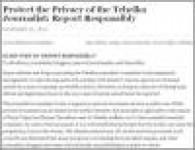Tehelka case: double standards on privacy?

Does being a journalist make us different from a common man? Perhaps yes according to the media and my fellow journalist colleagues. And the alleged Tehelka sexual harassment case where the magazine’s editor-in-chief has been accused of sexually harassing his junior, a female journalist, is a case in point.
Yesterday, I received a mail, a Google document being circulated requesting people to keep the identity of the female journalist confidential to respect her honour and dignity. It was signed by several journalists, students and activists. On November 22, the same request was also posted at on the website Kafila as an article “Protect the Privacy of the Tehelka Journalist: Report Responsibly”.
They say, “The journalist’s complaint to her company is a private document and not a public one. While private documents can be leaked in the ‘public interest’, this principle is applicable to the emails of Tarun Tejpal and Shoma Chaudhury sent to Tehelka staffers, not to the journalist’s emailed complaint. In cases of sexual assault, it is a well established principle that the media can name the perpetrator, but not the victim. The identity and privacy of a victim must be protected at all costs. We are distressed that many people are circulating the journalist’s emails, and other journalists, bloggers and users of social media are publishing it in parts or whole.”
To my amusement, a lot of journalists and others who have signed this petition are the ones who are also keeping a close tab on the Tehelka case. They have regular access to the private mails being written by the female journalist, her editors and Tehelka staffers. That’s not all. They also have minute to minute details about the events happening in Tehelka premises.
The petition/request has left me puzzled. If these people were so concerned, what is the need for them to go through the complainant’s email which she had “privately” written to her managing editor describing the events? It’s validated from the fact when they defend the victim by using her arguments and how much she was scared by what was happening to her.
It is ironical that signers of this petition have the “right” to read and openly discuss the issue because it’s someone related to their profession but they want common man to refrain from knowing facts and commenting - be it in newspapers, magazine or social media. I have been a witness to this several times now in last five days. The censorship is so much that my colleagues and fellow journalists don't allow me to take the name of the victim.
Everybody in the media is going gaga about reporting responsibly in this case. But I wish to know why this is a special case. Just because a fellow female journalist and somebody they know are involved.
When a MMS of a Congress senior leader getting physical with a female lawyer was leaked, no one in the media had the courage or tried to protect the identity of that lady or circulate a petition. Even in self-styled Godman Asaram’s case, the name of the teenage girl who had filed the complaint was openly being used. In fact, the journalists who stop me from taking the Tehelka victim's name had reported on these events and were openly using the complainant's name in their articles and discussions. Nobody talked about her honour and privacy.
The fact that a journalist’s own parameters can decide what is private and what is public is really questionable, and needs to be introspected on in the Indian media. These double standards that journalists have developed is what really shocks me. The episode has once again put me in dilemma about why a journalist is not like any other common person.
Another example is the reporting by Business Standard on Snoopgate, where they gave details about the girl’s family who was allegedly put under vigilance. The report gives the names of the father, brother and their companies. Nobody in the media talked about this girl’s honour or privacy.
It’s high time - and I think as a journalist - we should define exactly what ‘public’ is?
(The article is not intended to offend anyone and aims to highlight the double standards prevalent in the Indian media)






